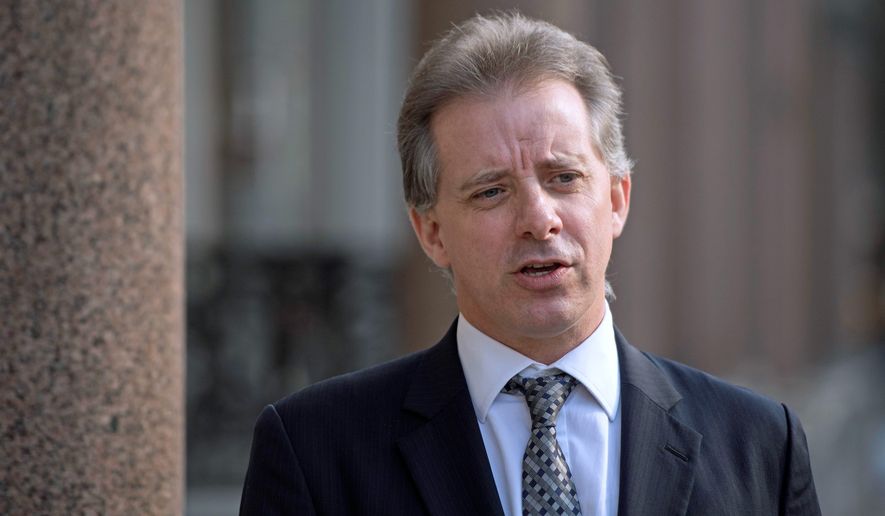One of the FBI’s big selling points for the Democratic Party-financed Steele dossier is that its creator, former British spy Christopher Steele, had proven his veracity in previously providing information on an international soccer scandal.
That is what the FBI told a judge to obtain a year’s worth of wiretaps on Trump associate Carter Page.
It turned out it wasn’t true, according to the Justice Department’s inspector general report released Monday.
Hardly any of Mr. Steele’s FIFA soccer information was corroborated. And none was used in court, contrary to what was attested to by FBI in its Foreign Intelligence Surveillance Court (FISA) application.
“According to the handling agent, he would not have approved the representation in the application because only ’some’ of Steele’s prior reporting had been corroborated — most of it had not — and because Steele’s information was never used in a criminal proceeding,” said Inspector General Michael E. Horowitz.
“We found that the team had speculated that Steele’s prior reporting had been corroborated and used in criminal proceedings without clearing the representation with Steele’s handling agent.”
DOCUMENT: Read the report from the DOJ Office of the Inspector General
And in another glaring error, Mr. Steele’s main dossier source disagreed with anti-Trump assertions in his dossier after it was posted online in January 2017. But the FBI failed to include that denial in subsequent wiretap renewals.
The source said he or she never told Mr. Steele that Mr. Page met with an unsavory Kremlin figure while on a public trip to Moscow in July 2016.
In another instance of an FBI error, Mr. Page told agents he was a CIA asset, the CIA confirmed in an email. But an FBI lawyer changed the “yes” to a “no.”
Mr. Steele also apparently lied to agents when they traveled to Rome for a briefing in October. His agent handler asked if he was involved in a Yahoo News story and Mr. Steele responded “no.” The FBI then used the Yahoo article as corroboration in the FISA application. But in fact, Mr. Steele had been the Yahoo source.
In Rome, Mr. Steele described one of his main dossier sources as a “boaster” and “egotist” who “may engage in some embellishment.” The FBI failed to include that caveat in the FISA application or tell its intelligence unit, the IG said.
In Rome, agents also disclosed sensitive information to Mr. Steele about its Crossfire Hurricane probe into the Trump campaign. An agent mentioned the name of George Papadopoulos, a Trump adviser and FBI target. Some agents told the IG the disclosure was improper.
After the Rome meeting, Mr. Steele worked for two bosses: Fusion GPS, which was being paid by the Hillary Clinton presidential campaign and Democratic National Committee; and the FBI.
He began filing anti-Trump allegations that were not in the dossier being sent to Fusion.
One was that Russian military intelligence was funneling money to Mr. Trump “by way of an Azerbaijani family.”
In special counsel Robert Mueller’s report in March, there was no mention of such an arrangement. Mr. Mueller said he did not establish a conspiracy between Mr. Trump and the Kremlin, as Mr. Steele alleged in his 35-page dossier that concluded in December 2016.
Mr. Steele later came to Washington to brief reporters and State Department officials on all of his anti-Trump allegations.
One was that Trump campaign manager Paul Manafort worked as a go-between with the Kremlin on election interference. The Mueller report said that didn’t happen.
A Washington Times analysis found 13 conspiracy allegations inside the dossier, all of which were disproven or unverified.
Mr. Steele and Fusion pushed another bogus story. They contended that the Trump Organization and Alfa Bank, Russia’s largest commercial bank, maintained a dedicated computer server for secret communications.
Fusion’s Glenn Simpson sold the story to Slate.com and The New Yorker.
The IG report quotes the FBI as saying the story is false.
“The FBI investigated whether there were cyber links between the Trump Organization and Alfa Bank, but had concluded by early February 2017 that there were no such links,” the FBI said. “The Supervisory Intel Analyst told us that he factored the Alfa Bank/Trump server allegations into his assessment of Steele’s reporting.”
• Rowan Scarborough can be reached at rscarborough@washingtontimes.com.




Please read our comment policy before commenting.